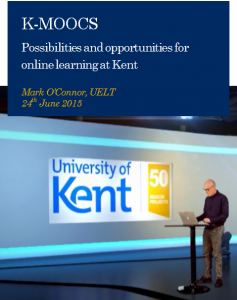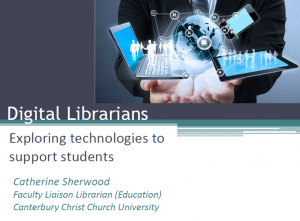Our summer LibChat on 24th June 2015 on ‘digital life’ proved to be such a wide-reaching topic that it involved three speakers each with a different perspective.
MOOCs: The Possibilities and Opportunities for Online Learning at Kent. The K-MOOCs Beacon project – Dr Mark O’Connor

The project investigated how MOOCs, free online international courses, could enhance the university’s reputation. They also considered its value for outreach and how it could be marketed to academic audiences. The project explored how MOOCs could enhance the digital skills of academic staff and produce resources that could be used in teaching via blended learning.
The team created a MOOC on Functional programming with Erlang in close collaboration with an academic, Professor Simon Thompson (http://www.kent.ac.uk/elearning/themes/kmoocs.html ). It could be used for revision and as an introduction for first year students. They promoted the course through Twitter and gained more participants than expected, which were finally limited to five hundred. The MOOC was hosted on External Moodle and used KentPlayer. One teaching assistant was dedicated to supporting the course. The biggest cohorts were from the US and UK, and 95% of the participants were male.
Each week there were a series of activities. Videos were effective as they could show live coding while other sections encouraged participants to add to discussions. Masterclasses featuring experts from outside the University showed how Erlang can be used to solve real problems. These videos took three days to film and two months to edit, although when complete could be reused in teaching. The MOOC took two weeks to build in Moodle, based on the FutureLearn layout. It was challenging adapting the raw material from courses into Moodle. The project team has since recommended that any future MOOCs are created on FutureLearn, a dedicated platform. In the future, they visualise the creation of three to six courses per year spread across faculties.
Digital Librarians: Exploring technologies to support students – Catherine Sherwood

Catherine, the Faculty Liaison Librarian for Education at Canterbury Christchurch, highlighted three reasons for library services to engage with new technology:
- Providing a parity of service for distance learners, students on placement or those living off campus.
- Offering a flexible service to meet the needs of those with other commitments (e.g. children, work, etc.) who need to access information on the move.
- Engaging with students in the virtual spaces that they use.
Catherine discussed the different technologies employed by the Academic Services team at Canterbury Christchurch. These included the VLE Blackboard where they have created a library folder which includes links, an introductory video and lectures. Catherine has used Kaltura and Screencast while also providing links to bite-sized videos on YouTube which tutors can play in classes. Catherine showed a Powtoon animation which she created to start her workshops as a fun introduction.
Another colleague has pioneered the use of webinars to introduce the library and collaborative software for students based in Kent, Bristol and Athens. These sessions were recorded and uploaded to Blackboard for the use of other students who could not take part. Web conference software also enabled a reading group to connect and work with their tutor. Skype was useful for one-to-one tutorials, especially for distance researchers. The team have developed their Twitter presence and increased the number of followers through a competition. They have created Twitter accounts for individual subjects, for example for the Education and Health students, which will improve the relevancy of information for followers.
The challenges of engaging with new technology included learning how to use new tools, keeping focused on the pedagogical theory, the difficulty of filming in an open-plan office and also being part of an institution with its own rules and regulations.
The benefits included gaining confidence through learning how to use the new technologies, partnership working with for example Learning Technologists and sharing knowledge amongst the team.
In the future they would like to introduce an online chat service, blog, more online inductions and tutorials, student videos of personal library experiences and improve the University’s app.
Student Experience of Digital Life – Jess Vincent

Our final speaker was a postgraduate student from the University of Kent, Jess Vincent, who spoke about her experience of digital life. Jess showed an image of her study bedroom and explained that connecting to the internet had been very easy with the University’s guide. Internet speed is good which is essential for her studies and also to compensate for the poor phone signal. Jess also praised remote printing as all she needs to do is log in, print a file, walk to the printer and collect the document, rather than going to a PC room. She felt that this service should be more widely publicised.
Another tool which Jess recommends is the ‘Where can I study?’ webpage, which is particularly useful for stressed undergraduates who cannot find a PC in the library as it shows where available PCs are across campus.
LibrarySearch is great for research as she can type in very niche or obscure keywords and it will often bring back results. It also highlights new or unfamiliar resources. In contrast, as a member of IS staff working within Stock Control, she has found it less useful in providing detailed records for items and prefers to use the previous catalogue.
As an undergraduate, Moodle was very helpful as it contained everything she needed for her course, including weekly plans, readings, links, forums and a place to submit essays.
Jess explained that in terms of online resources, e-books were ideal during exam season when books are in high demand; however, it is difficult to browse through them especially if they take time to load. Jess found that she had discovered more online resources, such as Box of Broadcasts, as a staff member than as a student. She recommended that information on these resources be given throughout the year, not only at induction, as many of her peers were not focused on study at the start of the year.
Lynsey
All of the speakers have kindly provided their presentations for display on our blog.

